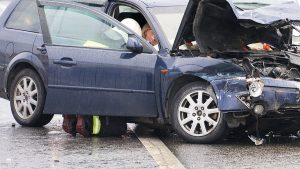Can a Passenger Be Liable for a Car Accident?
 Michael Babboni
Car Accidents
You may be wondering if a passenger can be liable for a car accident. If so, then you have come to the right place. There are 6 million auto accidents each year in the United States on average. So, how many of those accidents are caused by the passengers?
Michael Babboni
Car Accidents
You may be wondering if a passenger can be liable for a car accident. If so, then you have come to the right place. There are 6 million auto accidents each year in the United States on average. So, how many of those accidents are caused by the passengers?In most cases, passengers are excluded when determining liability for an accident. However, there are a few instances where they can be held liable for the damages caused.
Who Is Considered a Passenger?
A passenger is any person traveling with the driver who has little to no responsibility for operating the vehicle. If the acts of the passenger contributed to the cause of the accident, then some fault may be pointed to them in a personal injury case, even if it is just partial fault.
When a Passenger Can Be Held Liable
Here are some specific instances when a passenger may be liable for an auto accident.
• Operating the vehicle as a passenger: if the passenger grabs the steering wheel at any point and for whatever reason and leads to an accident, the passenger may be held liable. This also includes controlling the brakes, the gear shifts, or any other part of the vehicle that influences its overall maneuverability.
• Encouraging or enabling the driver: a passenger can also be held liable for damages if they enabled or encouraged the vehicle driver to drive while they are unfit to do so. For example, when the driver is under the influence of alcohol but the passenger asks for a ride anyways.
• Interference from the passenger: the passenger may also be held liable if they interfered with the driver's ability to operate their vehicle. This includes if a passenger covers the driver's eyes, tugs at them, or verbally distracts them.
Other acts performed by the passenger that can result in an auto accident include yelling out the window or throwing items out of the car, blocking the driver's view of the road, spilling hot liquid on the driver, assaulting another passenger in the vehicle, attempting to jump out of the car while it is moving, and purposely startling the driver with a loud noise or a sudden and intrusive action.
Duty of Care
Everyone must show a duty of care when it comes to preventing accidents and causing harm to others. Drivers must follow all traffic laws, avoid driving while distracted, keep their vehicle properly maintained, and stay alert while driving.
Drivers should also be aware of their surroundings and watch for road hazards, use turn signals and headlights, and avoid driving while fatigued.
Passengers also have a duty of care when they are in someone else's vehicle. They should not engage in any behavior that can cause the driver to become distracted and ultimately lose control of their vehicle.
Proving Negligence
When it comes to proving negligence in this type of case, the attorney must establish the passenger's negligence and prove that it caused the accident. We recommend you consult with an experienced attorney who has handled similar cases.
An attorney can help prove the passenger owed a duty of care, they breached or violated their duty of care, and their actions caused injuries and damages.
